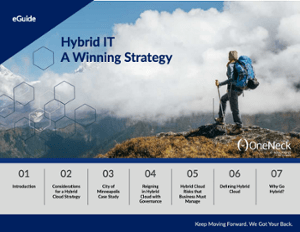- Cloud
- Data Centers
- Managed Services
- Professional Services
- Security
- Partners
- Resources
- About Us
Menu
What is Hybrid Cloud?
The term hybrid cloud may be overused and therefore misunderstood. According to the National Institute of Standards and Commerce, the proper definition of the hybrid cloud is “[Hybrid] cloud infrastructure is a composition of two or more distant cloud infrastructures (private, community or public) that remain unique entities, but that are bound together by standardized or proprietary technology that enables data and application portability.”
By this definition, it becomes apparent that a hybrid cloud environment is more involved than just connecting a server to a public cloud. Instead, a hybrid cloud must have one or more distinct private clouds working in tandem with one or more public clouds, with each cloud being able to function independently of one another.
Download our eGuide, Hybrid IT – A Winning Strategy, to learn more.
Benefits of Hybrid Cloud
If you are considering a hybrid cloud approach, there are many benefits you might realize, such as:
- Secure data and applications
- Manage shadow IT
- Achieve scalability
- Cut costs
- Maintain control
- Ensure performance, reliability and availability
- Implement new capabilities and innovative technology
Hybrid Cloud Strategy
Businesses need an IT strategy that best balances the physical security of keeping mission critical assets on-premises with the nearly unlimited opportunity of the cloud. Hybrid cloud allows firms to access the economies of scale associated with a public cloud solution and still provides scalability and security for their most mission-critical data and applications.
The downside of the hybrid cloud is the high level of complexity involved with migrating and deploying different functions to different parts of your IT infrastructure, and maintaining their interoperability once they are deployed. This is why experts agree how important it is for organizations to partner with a capable cloud solutions provider and consultant.
Hybrid Cloud vs Multi-Cloud
In today’s digital world, terms like Hybrid Cloud and Multi-Cloud are thrown around interchangeably. But there is a difference.
TechTarget defines Hybrid cloud as a cloud computing environment that uses a mix of an on-premises, private cloud and a third-party, public cloud, with orchestration between the two.
On the other hand, Multi-Cloud refers to a combination of multiple public cloud services and providers. These aren’t necessarily managed through orchestration software and could very well be separate deployments.
Which one is right for you? Read this blog for more information.
Examples of Hybrid Cloud
The City of Minneapolis was in need of a new hybrid cloud solution provider to help with their aging network infrastructure. Find out how OneNeck was able to save the city more than $3 Million annually in this case study.
Hybrid Cloud Deployment
Hybrid cloud is more than a middle ground between public and private cloud, and involves more than simply running difference workloads in different IT environments. Fully realized hybrid cloud deployments integrate compute, storage, security, networking, applications and management into a common, highly orchestrated on-site/off-site IT operations ‘workspace,’ enabling developers and operations personnel to leverage the speed and agility of public cloud in concert with existing tools, systems and policies being used in the enterprise data center. Learn more in this pathfinder paper.
Hybrid Cloud Assessment
Still confused if a hybrid cloud solution is right for you? Not sure where to start? OneNeck offers a Hybrid Cloud Assessment that can help you see the big picture, where your organization stacks up against your peers, and establish a baseline in moving you towards a true hybrid cloud solution. Contact us utilizing the form below for more information.
Looking for more resources? Visit our HPE hybrid cloud resource center.
Get In Touch
Call Us
For general inquiries, call: 855.ONENECK
Immediate Assistance
Managed services support: 800.272.3077
Non-managed service support: 515.334.5755
Or visit our service desk:
Service Desk Portal
Chat With Us
Hours available: 24/7
Start a Chat
OneNeck Headquarters
525 Junction Road
Madison, WI 53717
View All Locations
Talk to Our Team


